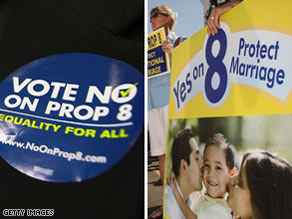(CNN) -- A ballot initiative to ban gay marriage in California appears headed for a narrow defeat, exit polls showed.

Voters in California, Arizona and Florida weigh in on constitutional bans on same-sex marriage.
Proposition Eight, which would eliminate the right of same-sex couples
to marry in California, was losing -- 53 percent to 47 percent,
according to the polling. If it were to pass, it would undo a state
Supreme Court ruling in May legalizing same-sex unions.
The
projections in California differed from Arizona, where voters approved
a measure to amend the state constitution so that only a union between
one man and one woman would be recognized as a marriage, CNN projected.
The measure passed by 56 percent in a reversal of direction from 2006, when a similar measure on the ballot failed.
Arizona, California and Florida were the only states to weigh
constitutional amendments banning same-sex unions, down from 11 states
in the 2004 election. Results are still pending in Florida.
The projected results were just some of the hot-button issues in an
election where ballot measures were dominated by social issues from
abortion and affirmative action to suicide and drug policy.
As
of 1:30 a.m. ET, CNN had projected results on most major initiatives,
based on actual results and exit poll data from key areas.
Fifty-seven percent of voters
in Arkansas supported a measure to prohibit unmarried sexual partners
from adopting children or from serving as foster parents. The measure
specifies that the prohibition applies to both opposite-sex as well as
same-sex couples.
Voters in Colorado rejected a measure defining
a person to "include any human being from the moment of fertilization,"
which would have applied to sections of the Colorado Constitution that
protect "natural and essential rights of persons."
Nebraska
voters approved a measure to prohibit state governments from
discriminating against or granting preferential treatment to people
based on race, ethnicity, color, sex or national origin. Results on a
similar measure in Colorado have not been announced.
Michigan
chose to become the 13th state to legalize marijuana for medical
purposes by a 64 percent margin. Massachusetts also had a proposed
initiative to decriminalize penalties for possession of less than an
ounce of marijuana.
Voters in Michigan also chose to amend the
state constitution to permit human embryonic stem cell research with
certain restrictions. The embryos, which must have been created for
fertility treatment purposes, would have to have been discarded
otherwise, and they may not be used more than 14 days after cell
division has begun.
South Dakota rejected a proposal to prohibit abortions
except in cases of rape or incest or where the mother's life or health
is at risk. A similar measure that did not include exceptions for rape
or the health of the mother was on the ballot in 2006, but voters
rejected it 44 to 56 percent
Results are still pending for
California's Proposition 4, which requires physicians to provide
parental notification to guardians of minors at least 48 hours before
performing an abortion.iReport.com: Watch Prop 8 debate in Utah
In Washington, 58 percent of voters supported a citizen initiative to
allow adults with six months or less to live to request lethal
medication prescribed by a physician. A physician is not required to
comply, but anyone participating "in good faith" with the request would
not risk criminal prosecution.
Many states also weighed budget-related proposals that could significantly affect how state revenues are generated.
In Massachusetts, voters have rejected a measure to cut the state
personal income tax rate in half for 2009 and eliminate the state
personal income tax starting in 2010. A similar ballot measure failed
in 2002.
A citizen-initiated measure in North Dakota also
proposed cutting personal income tax rates by half. Voters in Colorado
and Minnesota were asked to consider increasing sales taxes. Oregon's
Measure 59 would allow taxpayers to deduct the full amount of their
federal income taxes on their state income tax returns.
Voters
in eight states considered proposals related to gambling and lotteries,
including Maryland, where current law prohibits the operation of
commercial slot machines. Voters approved a constitutional amendment to
authorize the use of video lottery terminals, or slot machines, at
certain locations in the state, to fund public education.
Californians could face jail time if voters approve Proposition 2,
which outlaws the confinement of pregnant pigs, calves raised for veal,
and egg-laying hens "in a manner that does not allow them to turn
around freely."
 Sylvia Vega-Sutfin, Linda Weekes, Cheryle McNeil, and Isabelle
Guajardo filed a wrongful termination suit against subprime lender BNC
Sylvia Vega-Sutfin, Linda Weekes, Cheryle McNeil, and Isabelle
Guajardo filed a wrongful termination suit against subprime lender BNC


